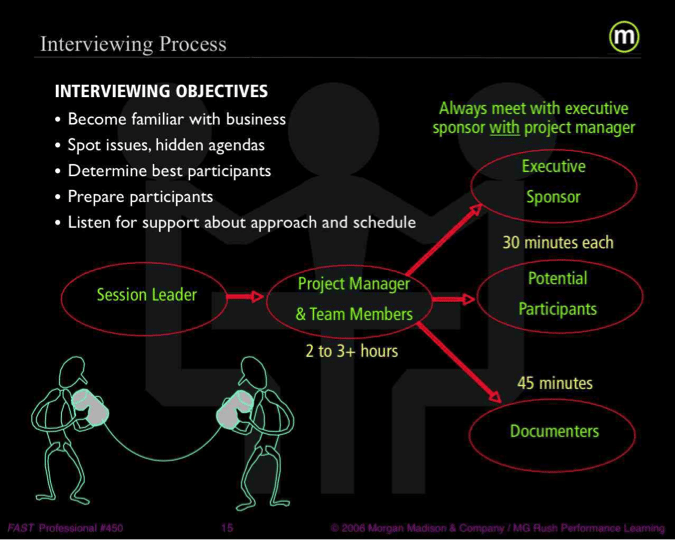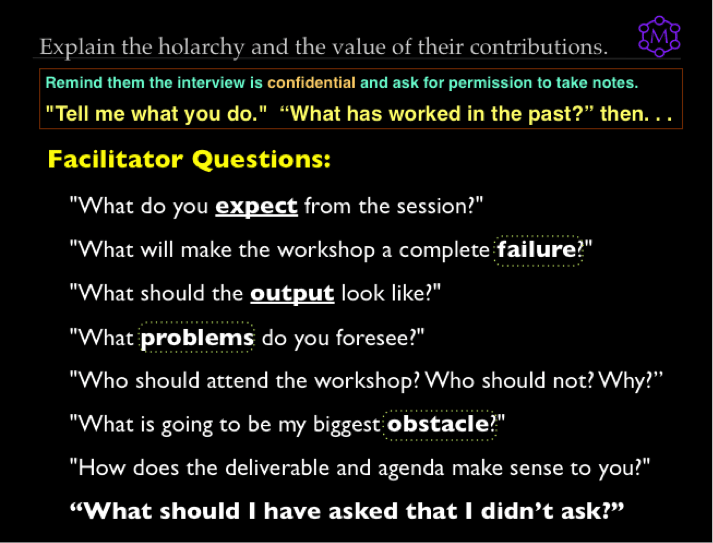Interview participants to understand as much as possible about them, the people they work with, and their business.
To understand the political risks in meetings, speak with your participants. Preferably, sit with them one-on-one for about 30 minutes. Speak with each face-to-face, or at least by way of a teleconference.
Political Risks in Meetings — Interview Sequence
First meet the executive sponsor, the business partners, the project team, and then the participants. Keep your interviews around twenty to thirty minutes each. Conduct the interviews privately and assure participants that their responses will be kept CONFIDENTIAL. You want them to comfortably share the cultural dynamics, especially those who may not get along with each other. Because you will probably want to take notes, ASK FOR PERMISSION. It sends an incongruent signal to claim the conversation is confidential and then to take copious notes, so ask for permission. Only a few will say no. More will compliment you for the courtesy of asking.
Political Risks in Meetings — Interview Objectives
Interview the participants to understand:
- To become familiar with their job, their business, and their expectations
- To confirm who should, or should not, attend and why
- How to help them show up better prepared to contribute
- To identify potential issues, hidden agendas, and other obstacles
- To identify scheduling conflicts and other concerns
- How to transfer ownership of the purpose, scope, and deliverables
Political Risks in Meetings — INTERVIEWING QUESTIONS
The following are well-sequenced questions that you should ask. Begin each interview by explaining your role and the purpose of the interview. Don’t forget to ask for permission to take notes. Use open-ended questions, sit back, and listen to the person—discover their value and value add to the initiative you are supporting.
Facilitator Style Questions
Participant Selection
Optimally you should choose the best participants. The business and technical partners along with the executive sponsor should approve the list. The method works like this:
- Ask the partners who should participate—make a list.
- Have your executive sponsor detail who should participate—adjust the list.
- Ask each participant who should participate—adjust the list.
When you have finished interviewing the participants, explain to the partners who you believe should participate and why. The partners will accept or modify the list. Once you both agree, have the partners get the executive sponsor to approve.
______
Don’t ruin your career by hosting bad meetings. Sign up for a workshop or send this to someone who should. MGRUSH workshops focus on meeting design and practice. Each person practices tools, methods, and activities every day during the week. Therefore, while some call this immersion, we call it the road to building high-value facilitation skills.
Our workshops also provide a superb way to earn up to 40 SEUs from the Scrum Alliance, 40 CDUs from IIBA, 40 Continuous Learning Points (CLPs) based on Federal Acquisition Certification Continuous Professional Learning Requirements using Training and Education activities, 40 Professional Development Units (PDUs) from SAVE International, as well as 4.0 CEUs for other professions. (See workshop and Reference Manual descriptions for details.)
Want a free 10-minute break timer? Sign up for our once-monthly newsletter HERE and receive a timer along with four other of our favorite facilitation tools, free.

Terrence Metz, president of MG RUSH Facilitation Training, was just 22-years-old and working as a Sales Engineer at Honeywell when he recognized a widespread problem—most meetings were ineffective and poorly led, wasting both time and company resources. However, he also observed meetings that worked. What set them apart? A well-prepared leader who structured the session to ensure participants contributed meaningfully and achieved clear outcomes.
Throughout his career, Metz, who earned an MBA from Kellogg (Northwestern University) experienced and also trained in various facilitation techniques. In 2004, he purchased MG RUSH where he shifted his focus toward improving established meeting designs and building a curriculum that would teach others how to lead, facilitate, and structure meetings that drive results. His expertise in training world-class facilitators led to the 2020 publication of Meetings That Get Results: A Guide to Building Better Meetings, a comprehensive resource on effectively building consensus.
Grounded in the principle that “nobody is smarter than everybody,” the book details the why, what, and how of building consensus when making decisions, planning, and solving problems. Along with a Participant’s Guide and supplemental workshops, it supports learning from foundational awareness to professional certification.
Metz’s first book, Change or Die: A Business Process Improvement Manual, tackled the challenges of process optimization. His upcoming book, Catalyst: Facilitating Innovation, focuses on meetings and workshops that don’t simply end when time runs out but conclude with actionable next steps and clear assignments—ensuring progress beyond discussions and ideas.






Reblogged this on Gr8fullsoul.